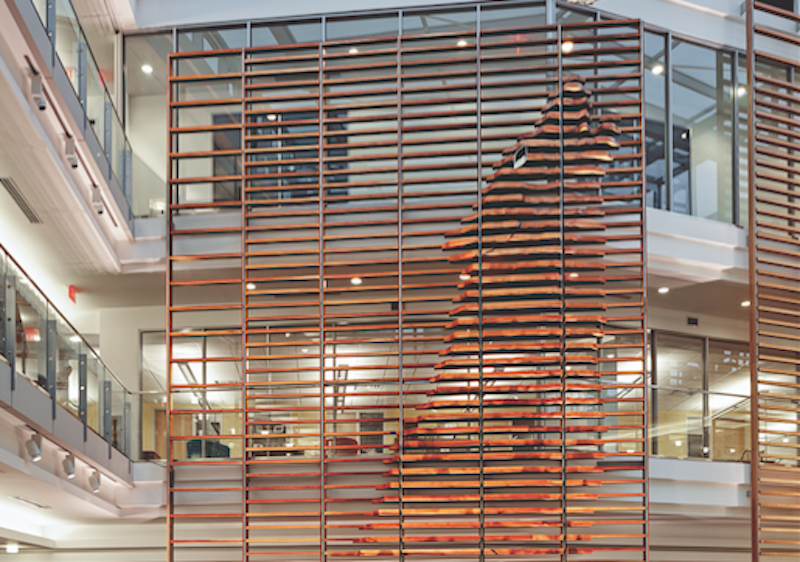Funding for the nation’s 1,700 or so public two- and four-year colleges remains well below pre-recession levels. Average state spending per student has fallen 17%—about $1,525—since the recession, according to the Center on Budget and Policy Priorities.
TOP 100 UNIVERSITY ARCHITECTURE FIRMS
Rank, Firm, 2015 Revenue
1. Gensler $79,810,000
2. Perkins+Will $59,960,000
3. CannonDesign $56,800,000
4. EYP $46,539,910
5. Stantec $37,993,785
6. Robert A.M. Stern Architects $24,802,000
7. Clark Nexsen $24,561,000
8. S/L/A/M Collaborative, The $21,833,000
9. CO Architects $21,475,500
10. HDR $21,406,400
TOP 100 UNIVERSITY CONSTRUCTION FIRMS
Rank, Firm, 2015 Revenue
1. Turner Construction Co. $1,124,325,847
2. Whiting-Turner Contracting Co., The $772,402,993
3. Skanska USA $535,834,200
4. Messer Construction Co. $521,400,000
5. Barton Malow Co. $470,447,175
6. Gilbane Building Co. $429,741,000
7. McCarthy Holdings $357,875,128
8. Consigli Building Group $343,722,913
9. Clark Group $335,471,145
10. Hensel Phelps $305,040,000
TOP 70 UNIVERSITY ENGINEERING FIRMS
Rank, Firm, 2015 Revenue
1. AECOM $65,000,000
2. WSP | Parsons Brinckerhoff $37,988,000
3. Jacobs $31,600,000
4. Affiliated Engineers $19,264,000
5. KJWW / TTG $16,943,913
6. Arup $15,856,593
7. Vanderweil Engineers $15,351,800
8. Simpson Gumpertz & Heger $13,586,000
9. Thornton Tomasetti $13,363,234
10. Dewberry $12,904,401
Money woes will continue to affect capital budgets and operations and maintenance allocations, says Mike Broge, PE, LEED AP, Higher Education Market Leader with Affiliated Engineers. That will only worsen an already significant backlog of deferred maintenance at many institutions, he says.
Budget constraints are compelling some public institutions to pursue alternative methods of financing their major building projects.
The University of Kansas leveraged a public-private partnership to initiate a $350 million redevelopment of its central district. The P3 deal includes a 265,000-sf integrated science building, a 40,000-sf student union, a central utility plant, student housing, and infrastructure upgrades. Most of the projects are scheduled for completion in mid-2018.
The University of Kentucky is among the schools that are enlisting developers to oversee their large on-campus projects. Memphis-based EdR is developing 14 new residence halls totaling 2.6 million sf on the Lexington campus. Two buildings are scheduled to open this fall; the others will be completed next summer.
“This approach keeps costs off universities’ books while still allowing them to stay ahead of the competitive curve with their facilities and on-campus amenities,” says Tim Steigerwald, SVP with Messer Construction.
Lack of capital has also contributed to a surge in master planning projects. Steigerwald says the University of Wisconsin is developing master plans for at least three large colleges, plus an overall campus infrastructure master plan. The goal: to achieve more efficient use of existing facilities through lower-cost renovations and spatial reconfigurations, thus avoiding costly additions or new facilities.
THE RISE OF INNOVATION SPACES ON Campus
To better equip students to excel in their future work environments, schools are developing a range of innovation spaces that promote hands-on, cross-disciplinary learning, foster unique business and industry partnerships, and encourage entrepreneurship.
Jeff Stebar, AIA, LEED AP, Higher Education Practice Leader at Perkins+Will, says that a phenomenon he calls “serendipitous cross-pollination” can occur across multiple disciplines working together in the same place. Such a structure models the 21st-century workplace and adds richness to the educational experience. “These spaces are typically owned by everyone, not by any specific college or dean,” he says.
That’s the idea behind the Collaborative Learning and Innovation Complex at Tufts University, Medford, Mass. Designer Stantec is transforming a 100-year-old warehouse into a new 95,000-sf facility that will house seven departments, ranging from physics and robotics to human development and community health. The teaching/research building incorporates open research labs shared by multiple areas of study, along with public social zones to foster interdepartmental collaboration. The project is part of a new Science and Technology Corridor that will also include a new 80,000-sf Science and Engineering Complex, designed by Payette. It is scheduled to open in 2017.
At the University of Utah, Lassonde Studios, designed by CannonDesign and Yazdani Studio, fuses a 400-bed residence hall with 20,000 sf of “garage space” where students can build a prototype, attend an event, or launch a business. Opening this fall, the facility has been designed to advance the university’s nationally ranked entrepreneurship program.
College libraries are also adapting to include technology-driven laboratories, informal group study workspaces, and cafés. A new 220,000-sf library under construction on Temple University’s main campus in Philadelphia will replace an existing 1960s-era facility with a dynamic, technology-rich environment. Designed by Snøhetta and Stantec, the $170 million project will accommodate Temple’s 2.5-million volume collection, student study space, research space, and staff areas.
A renewed interest in health careers is fueling demand for new health profession classroom buildings, clinical labs, and health-related research facilities.
“This trend is due in large part to a growing number of students who recognize the career opportunities afforded by a healthcare industry in the midst of a significant workforce shortage,” says Steve Rhoades, PE, LEED AP, Managing Principal, KJWW.
A 70,000-sf addition to the Columbia University nursing school is currently under construction in Manhattan. Designed by CO Architects and FXFOWLE, the seven-story structure will supplement the school’s existing classroom facilities with healthcare simulation technology, research facilities, and collaboration space. Expected to open in 2017, the building will include mock operating rooms, ICUs, ERs, and exam rooms where students can hone their nursing skills.
Private institutions are also jumping on the healthcare education bandwagon. The University of Pikeville, a private liberal arts college of 2,300 students in the coal country of Kentucky, is building a new 100,000-sf health professions education building that will open next year. Designed by Ayers Saint Gross, the facility will house the Bluegrass State’s first College of Optometry, as well as a nursing facility. The project is part of a strategic plan to upgrade the education needs of the Central Appalachia region and meet the growing demand for optometrists.
RETURN TO THE GIANTS 300 LANDING PAGE
Related Stories
Building Team | Mar 8, 2023
Call for Speakers: BD+C’s 2023 Women in Residential + Commercial Construction Conference
The 2023 Women in Residential + Commercial Construction conference event will take place October 25-27 in Nashville, Tenn., and will bring together more than 300 women leaders from all facets of the $1.4 trillion U.S. residential and commercial constructing sector.
Reconstruction & Renovation | Mar 8, 2023
Hoffmann Architects + Engineers receives Lucy G. Moses Preservation Award from New York Landmarks Conservancy
Hoffmann Architects + Engineers, a design firm specializing in the rehabilitation of building exteriors, announces that the historic facade rehabilitation and window replacement at the 69th Regiment Armory has been selected for the Lucy G. Moses Preservation Award, the New York Landmarks Conservancy’s prestigious recognition for outstanding preservation efforts.
Architects | Mar 7, 2023
David Chipperfield named 2023 Pritzker Architecture Prize laureate
Widely regarded as architecture's highest honor, the 2023 Pritzker Architecture Prize has been awarded to UK-based architect David Chipperfield. In honoring Chipperfield with the award, the Pritzker Prize jury cited the architect's "commitment to an architecture of understated but transformative civic presence and the definition—even through private commissions—of the public realm."
Multifamily Housing | Mar 7, 2023
Multifamily housing development in Chicago takes design inspiration from patchwork and quilting
HUB 32, a 65-unit multifamily housing development, will provide affordable housing and community amenities in Chicago’s Garfield Park neighborhood. Brooks + Scarpa’s recently unveiled design takes inspiration from the American tradition of patchwork and quilting.
Industrial Facilities | Mar 6, 2023
The largest planned logistics and business park in North America gets under way in Southern California
The $25 billion World Logistics Center will boost the supply chain capabilities of Southern California and will serve as a distribution center for destinations across the continent.
Healthcare Facilities | Mar 6, 2023
NBBJ kicks off new design podcast with discussion on behavioral health facilities
During the second week of November, the architecture firm NBBJ launched a podcast series called Uplift, that focuses on the transformative power of design. Its first 30-minute episode homed in on designing for behavioral healthcare facilities, a hot topic given the increasing number of new construction and renovation projects in this subsector.
K-12 Schools | Mar 6, 2023
Benefitting kids through human-centric high school design
Ingrid Krueger, AIA, LEED AP, shares why empathetic, well-designed spaces are critical in high schools.
Adaptive Reuse | Mar 5, 2023
Pittsburgh offers funds for office-to-residential conversions
The City of Pittsburgh’s redevelopment agency is accepting applications for funding from developers on projects to convert office buildings into affordable housing. The city’s goals are to improve downtown vitality, make better use of underutilized and vacant commercial office space, and alleviate a housing shortage.
Student Housing | Mar 5, 2023
Calif. governor Gavin Newsom seeks to reform environmental law used to block student housing
California Gov. Gavin Newsom wants to reform a landmark state environmental law that he says was weaponized by wealthy homeowners to block badly needed housing for students at the University of California, Berkeley.
Green Renovation | Mar 5, 2023
Dept. of Energy offers $22 million for energy efficiency and building electrification upgrades
The Buildings Upgrade Prize (Buildings UP) sponsored by the U.S. Department of Energy is offering more than $22 million in cash prizes and technical assistance to teams across America. Prize recipients will be selected based on their ideas to accelerate widespread, equitable energy efficiency and building electrification upgrades.

















